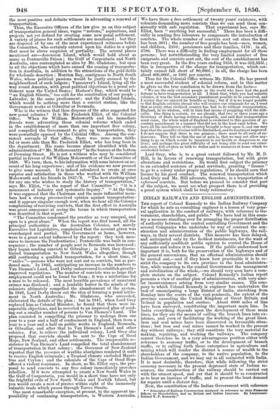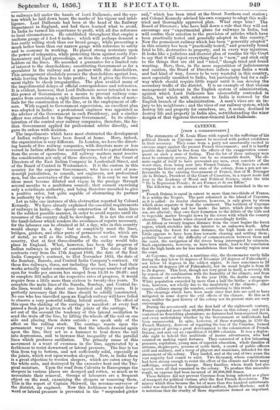INDIAN RAILWAYS AND ENGLISH ADMINISTRATION.
THE report of Colonel Kennedy to the Indian Railway Company for which he acts as consulting engineer is a lesson of very gene- ral application in the conduct of railways, with reference to Go- vernment, shareholders, and public.* We have had in this coun- try a measure standing over for arranging the proper distribution of authority between the central controlling Government and the several Companies who undertake by way of contract the con- struction and administration of the public highways, the rail- ways, in their several districts. This measure has been delayed, and anticipated only by the feeblest instalments, for the want of any sufficiently confident public opinion to control the House of Commons and reduce it to reason. If the public understood how important it is, both for the preservation of the highways and of the general convenience, that an effectual administration should be carried out,—and if they knew how practicable it is to re- strict the company to its own province in the local administra- • tion, while reserving to the central Government the management and coordination of the whole,—we should very soon have a com- plete statute on the subject. Colonel Kennedy's Indian report presents a view of another plan of administration, with very simi- lar inconveniences arising from very similar causes. The com- pany to which Colonel Kennedy is engineer has undertaken the task of emancipating a large district of India, stretching from Bombay into the centre of the vast peninsula, the extent of the province exceeding the United Kingdom of Great Britain and Ireland in population and surface. About 4000 miles of line have been surveyed, constituting the important main line. In India everything depends upon the development of these main lines, for they are the means of calling the branch lines into ex- istence, and even of facilitating the working of the great lines. Iron and coal mines have been discovered in favourable situa- tions ; but iron and coal mines cannot be worked in the present day without railways ; they still constitute the very material for making, repairing, and working the railways. The company cannot therefore be in a very advantageous position either with reference to economy traffic, or to the development .of branch traffic, or to calling forth those enterprises in agriculture and mining which will render the district a source of wealth to the shareholders of the company, to the native population, to the Indian Government, and we may say to all connected with India. It is most desirable, therefore, that while following the strict economy necessary in the present depressed state of Indian re- sources, the construction of the railway should be carried out with the utmost speed, and yet that it should be so constructed as to bear an increase of traffic, and to present the least demand for repairs until a distant day. Now, the constitution of the Indian Government with reference
• Principles of Railway Construction Analyzed in reference to their Financial Effects on Shareholders, and on British and Indian Interests. By Lieutenant- Colonel T. P. Kennedy."
to railways fell under the hands of Lord Dalhousie, and the sys- tem which he laid down bears the marks of his vigour and intel- ligence. Lord Dalhousie had been at the head of the Railway Department in England, and had there learned what to avoid. In India he turned his experience to profit, with all due reference to local circumstances. He established throughout that empire a uniform gauge of 5 feet 6 inches ; which will perhaps demand a less costly rolling stock than our broad gauge, while presenting a much better basis than our narrow gauge with reference to safety and to economy in working. He placed strong restraints upon the power of companies, while protecting them against costly Par- liamentary and legal proceedings, or from the extortion of land- holders on the lines. He accorded a guarantee for a limited rate of interest to the shareholders ; constituting Government so far a speculator in the railway and a partner with the shareholders. This arrangement absolutely secures the shareholders against loss, while leaving them free to take profits ; but it gives the Govern- ment rights to check irre arities. The plan avoided many of the impedimental delays of official correspondence and references. It is evident, however, that Lord Dalhousie never intended to use this power of Government as a means to prevent railway com- panies from exercising a right discretion in the selection of mate- rials for the construction of the line, or in the employment of offi- cers. With regard to Government supervision, an excellent plan was adopted in India : a professional engineer was appointed as the adviser of the Government in each Presidency, and a similar officer was attached to the Supreme Government. In its admin- istration of the control over railway companies, therefore, the In- dian Government applied for professional advice directly, and gave its orders with decision. The impediments which have most obstructed the development of Indian railways have been found at home. Here, indeed, the organization is very different. In London, we have the direct- ing boards of five railway companies, with directors more or less versed in Indian affairs but necessarily removed to a great distance from the scene of operations. All railway matters must receive the consideration not only of these directors, but of the Court of Directors of the East Indian Company in Leadenhall Street, and of the Board of Control in Westminster. It is the custom in this country for the supreme Government, who have a sort of non- descript jurisdiction, to consult, not engineers, not professional men, but the secretaries of the companies. It is easy to see how ideas must become diluted and vague in the passage through several mouths to a multiform council; that council exercising only a coordinate authority, and being therefore unsuited to give a positive order, but quite capable of obstructing its partner in authority by a check. Let us take one instance of this obstruction reported by Colonel Kennedy. We have already explained the essential requirements of railways in India,—the speedy construction of the main lines in the solidest possible manner, in order to avoid repairs until the resources of the country shall be developed. It is not the cost of the hand-labour which renders the avoidance of repairs necessary, for the labourer can be obtained at 3d. a day, who in this country would charge 2s. a day : but so completely must the lines, bridges, girders, and other parts of permanent works, which are of metal, as well as the rolling stock, be sent out from this country, that at first three-fourths of the outlay would take place m England. What, however, has been the progress of Indian railways in point of construction ? The dates of their contracts vary from the 17th August 1849, the date of the East India Company's contract, to 21st November 1855, the date of the Bombay, Baroda, and Central India Company's contract. Of these five railways, three, not including the last, have had their works actually under construction. The average number of miles open for traffic per annum has ranged from 13.33 to 20.49; and to complete 335 miles at the respective rates of progress, it would require from a little more than sixteen to twenty-five years. To complete the main lines of the Baroda, Bombay, and Central In- dia lines, would take about one hundred and fifty years. It is perfectly necessary that the lines should be solidly constructed. No one who has travelled upon an English railway will have failed to observe a very powerful rolling lateral motion. The effect of this upon the shaking of the carriage is manifest : at every foot passed a fresh jar is given to all the joints of the carriage. We set out of the account the tendency of this lateral oscillation to send the train off the line, by lifting the wheels off the rail on one side and placing them down outside ; we speak only of the effect on the rolling stock. The carriage reacts upon the permanent way ; for every time that the wheels descend again upon the line, they act as a hammer to beat down the rail into depressions, and to increase that inequality of the parallel lines which produces oscillation. The primary cause of this movement is a want of evenness in the line, aggravated by a feebleness to resist downward or lateral pressure. The line is too thin from to to bottom, and not sufficiently solid, especially at the joints, which rest upon wooden sleepers. Now, in India there is a great objection to wooden sleepers, which are eaten away by the white ants, and destroyed by the excessive heat and the Tro- pical moisture. Upon the road from Calcutta to Raneegunge the sleepers in various places are decayed and rotten, so much as to necessitate their removal. Groups of labourers are a frequent object on the road, examining the sleepers or removing them. This is the report of Captain Shirwell, the revenue-surveyor of the district, an engineer. Now this feebleness to resist down- ward or lateral pressure is prevented in the " suspended girder rail," which has been tried at the Great Northern coal station; and Colonel Kennedy advised his own company to adopt this well- tried and thoroughly approved plan. What stops him? The Board of Directors ; who have laid down a rule that they will not encourage any " experimental plans for railways in India, but will confine their sanction to the provision of articles which have been practically tested and generally adopted in this country." Now the permanent railway which has been " generally adopted" in this country has been " practically tested," and generally found fatal to life, destructive to property, and in every way injurious. It looks like a judicious and discreet plan of routine for the Court to say that it will reject everything that is "new," and stick only to the things that are old and "tried," though tried and found wanting. Here, then, in the mere superstition ofjudiciousness and caution, the Board of Directors inflicts upon India a weak and bad kind of way, known to be very wasteful in this country, most especially unsuited to India, but particularly bad for a rail- way which should require little repair until it can develop the secondary traffic of the district. It is an example of that vicious management inherent in the English system of administration, against which Lord Dalhousie has successfully contended in India, but which with reference to India is restored by the English branch of the administration. A man's vices are an in- jury to his neighbours ; and the vices of our railway system, which destroy life and property for ourselves, are, it seems, destined to destroy life and property in India also, notwithstanding the wiser designs of that vigorous Governor-General Lord Dalhousie.



































 Previous page
Previous page